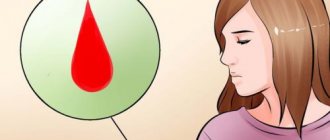The thought of how old women get their periods is unlikely to occur to young girls. Only when unusual physiological changes appear in the body do many women associate them with the approach of menopause.
It is impossible to determine in advance the age-related duration of the menstrual cycle. However, there are symptoms that may indicate that this period is approaching. Age-related changes that accompany menopause often cause psycho-emotional instability and physical discomfort. By adhering to the recommendations of the gynecologist, you can survive this period without any major shocks.
In most cases, menstruation may stop before age 55. While the first manifestations of hormonal dysfunction are observed from 40-45 years.
Briefly about menstruation
A healthy woman's period comes every month and lasts from four to six days. Sometimes the menstrual cycle gets confused, and they begin not on the planned dates, but earlier or later than the day marked on the calendar. This is a completely normal phenomenon for unfinished puberty, pregnancy or the postpartum period - however, a cycle failure for no apparent reason requires contacting a gynecologist, who will find out the cause and help solve it.
After childbirth, menstruation is temporarily replaced by specific discharge - lochia, which disappears after two weeks.
During the period of breastfeeding, menstruation may disappear completely for some time. This is a natural process that is regulated by the body in order to prevent a new pregnancy in such a short time. In medicine, this phenomenon is called lactational amenorrhea and should not be a cause for concern.
Reproductive cycle
In the body of all women there is an individual reproductive “clock”, which is called the menstrual cycle. This process is purely individual and occurs differently for each person. Typically the cycle length ranges from 21 to 36 days. On average, a cycle lasts 28 days - from the first day of one menstruation to the first day of the next. Consists of 4 phases: menstrual, follicular, ovulatory and luteal.
Normally, menstrual flow should not be too scanty in volume and last less than 2 days, since the endometrial layer has a thickness of 10–17 mm, plus the secretion of the glands of the cervix and vagina, and the egg has at least a small volume.
It happens that menstruation has just begun and immediately ended, and this contradicts all the laws of the reproductive cycle. Why is this happening?
Age-related cessation of menstruation
The complete cessation of menstruation in women primarily depends on the purely individual characteristics of the body. This period is called menopause, which most often begins from 41 to 60 years, while the average age of its onset is from 51 to 53 years. The cessation of menstruation is associated with the decline of ovarian function, decreased hormone production, or surgical interventions in the genitourinary system.
If the ovaries were removed due to their disease, menopause with the complete cessation of menstruation can occur as early as thirty years of age.
The cessation of menstruation before the age of 38 without an obvious reason may indicate premature ovarian failure - a disease that must be treated. To restore menstrual and reproductive function, women are prescribed medications that contain female sex hormones.
Also, the early cessation of menstruation can be influenced by factors such as constant stress, fasting, smoking, a vegetarian diet, improper use of hormonal contraceptives, and even living above sea level above 3500 meters. However, the controlled use of hormonal contraceptives can delay the onset of menopause by blocking ovulation, which preserves the ovarian follicular apparatus. This same device is destroyed by toxic substances from tobacco smoke if a woman smokes more than ten to fifteen cigarettes per day.
Age-related changes in a woman’s body
Age-related restructuring of the reproductive system and the functioning of the female organs occurs mainly after 45 years, and is called menopause. Until what age should full periods begin and when should this change be expected? Women who have already had children and have crossed the so-called age threshold are interested in finding out when to expect these characteristic changes that indicate the arrival of menopause. Menopause is an inevitable change in the functioning of a woman’s systems, which manifests itself individually and at different age intervals.
The arrival of menopause largely depends on many points surrounding a woman in everyday life. The timing of the onset of these irreversible age-related changes may be influenced by factors such as:
- surgical intervention in the functioning of the reproductive organs;
- sexual diseases;
- disrupted hormonal levels;
- environmental influences and other harmful chemical influences;
- heredity.
Menopause does not occur abruptly and suddenly; in medical practice it is usually divided into 3 phased periods: premenopause, menopause and postmenopause. The first phase is characterized by disruption of the menstrual cycle and characteristic changes in menstrual flow. The second is most clearly expressed symptomatically and is characterized by sharp jumps in hormonal imbalance. Postmenopause is indicated by the complete cessation of ovarian hormone production and cessation of estrogen secretion.
Symptoms indicating the onset of menopause:
- Irregularities in the menstrual cycle (irregularity and unusual amount of discharge).
- Hot flashes (uncontrollable hot flashes, rapid heartbeat, intense sweating).
- Psycho-emotional disorders and panic attacks.
- Depressed state or sudden change of mood.
- Insomnia or increased drowsiness and apathy.
- Exacerbation of chronic diseases.
- Disorders of the endocrine system.
- Metabolic disorders.
- Feeling of dry mucous membranes.
All of these symptoms that occur after 45 years of age signal the onset of hormonal changes, and most often will mean approaching menopause. In some female representatives, these symptoms manifest themselves clearly and cause a lot of unpleasant sensations, while other ladies do not feel any changes at all except for cycle disorders.
How to understand that menstruation is ending
Women's periods end forever when the body no longer produces the hormones necessary for childbearing. You can confidently say that your period has ended and menopause has arrived if there is a delay of more than a year.
The main symptoms of menopausal syndrome in women:
- Hot flashes, increased sweating, redness of the face occur, and the temperature may rise.
- The number of heart contractions often increases and this process is not associated with physical activity.
- Problems with sleep appear.
- Increased fatigue, malaise, feeling tired, low ability to work.
- Headaches and migraines are felt, memory deteriorates, and finger tremors appear.
- Often a woman may experience an unpleasant taste in her mouth, drying of the mucous membranes and a burning sensation. Mood swings and emotional imbalance are also observed.
Symptoms indicating approaching menopause
It is impossible to predict in advance at what age menstruation may stop completely. But when the first unnatural symptoms appear, you can expect the onset of hormonal changes in the body.
The most common symptoms of menopause include the following:
- change in the nature and cyclicity of menstrual flow (menstruation becomes scanty and irregular);
- sudden onset of a feeling of heat, accompanied by rapid heartbeat, redness of the face, and excessive sweating;
- psycho-emotional instability, panic attacks;
- depression;
- sleep disturbance;
- decreased performance;
- exacerbation of existing endocrine diseases (diabetes mellitus, thyroid disease, heart disease);
- slowdown of metabolism and, as a result, increase in body weight;
- deterioration of the skin, nails and hair;
- dryness of the vaginal mucosa.
These symptoms are a consequence of hormonal changes in the female body.
The listed signs do not always indicate the approach of menopause. Sometimes they can be caused by the appearance of various diseases: hypertension, diabetes, hyperthyroidism, cancer. Only a complete diagnostic examination will determine the cause of physiological changes.
You need to understand that changes in physiology are inevitable during the aging period of the reproductive system. Each woman experiences menopausal syndrome differently. For some, age-related hormonal changes are practically absent at the age of 40-50 years. For others, on the contrary, they are so pronounced that thoughts of wanting them to end quickly are constantly present.
How do you understand that the previously observed periods have already completely ended?
If menstrual flow is absent for more than 12 months, this indicates the onset of postmenopause.
Sometimes in the late period pathological spotting or uterine breakthrough bleeding appears. Such symptoms may indicate the development of endometrial hyperplastic process, the appearance of fibroids or cancer. To find out the cause of the anomaly, a histological examination of a tissue fragment of the endometrium is performed. After making sure that there is no oncological process, the doctor conducts an additional examination of the body.
The set of diagnostic measures includes the following procedures:
- blood test for hormones;
- ultrasound examination of the pelvic organs;
- colposcopy;
- hysteroscopy.
Based on the test results, the gynecologist prescribes treatment so that the abnormal discharge ends faster.
When does your period stop?
Menstruation stops between the ages of 45 and 55. But there may be a different age range, since each woman’s body is unique.
The date of menopause is also influenced by genetics. If a girl knows that her mother’s menopause began early - before the age of 40, then there is a chance that the successors of the family will have the same rate. The same applies to cases where periods can last longer - up to 60 years.
Menopause lasts quite a long time, and experts divide it into three stages.
Premenopause
The first stage begins on average at 45–50 years of age. The main symptom of this period is menstrual irregularity. Menstruation may be irregular - discharge is too frequent or absent from time to time. Premenopause lasts 1–6 years and during this period there is a high chance of gaining additional weight, so it is worth monitoring your diet. Other changes in the body are also observed: the number of wrinkles increases, the elasticity of the skin is lost.
Do not forget that pregnancy may be the reason for a delay in menstruation after 40 years, since the ability to bear children at this stage is preserved. But every month this probability decreases.
Menopause
The second stage occurs some time after the last menstruation. Menopause is characterized by a decrease in immunity, so health problems may arise. There is a risk of developing diabetes, cardiovascular diseases, obesity, and women's health problems. This period lasts one year and is the most difficult for a woman.
Menopause is the final cessation of menstruation. After it comes the third and final stage of menopause. Usually its onset is noted after 50–55 years.
Postmenopause
The third stage is characterized by improved health and well-being. Metabolic processes improve in the female body and all unpleasant symptoms disappear. Postmenopause lasts from five to fifteen years and is accompanied by aging of the body. The skin becomes less elastic, the amount of hair decreases, and the genitals lose their shape.
Menopause does not occur suddenly; the process takes a long time. For each woman it comes differently and at what age menstruation ends is difficult to say exactly. But there are some factors that can shorten the childbearing period and speed up the onset of menopause.
What you need to know about menstruation
Menstruation in women, what is it, why do they appear, and what should every girl and woman know about them? Let's talk a little about physiology and tell you how to determine the onset of any gynecological disease by the nature of menstruation.
Physiology
The time when girls' periods begin varies from person to person. The age of menarche, the first menstruation, is on average 12-14 years, but slight fluctuations in one direction or the other are possible. So, the first periods appear earlier in girls, mothers, and grandmothers whose critical days began at 11-12 years old. Especially considering the widespread phenomenon of acceleration. The appearance of early menstruation is more typical for women living in southern countries and southern Russia. After menarche, a girl officially becomes a girl, while her sexual characteristics begin to appear much earlier. The figure changes, the waist becomes thin, the hips wide, the mammary glands enlarge, hair appears in the armpits, legs, and pubis.
A woman before her period, and in this case a girl, may notice the appearance of acne on her face and back. A whitish discharge appears from the vagina, which does not cause discomfort.
The menstrual cycle is divided into 2 phases - before ovulation and after ovulation, these phases are regulated by different hormones. In the first phase of the cycle, menstruation occurs for the first 3-7 days. Afterwards, active maturation of follicles in the ovaries begins. And one of them, and sometimes even two, grows to be dominant. It, in turn, ruptures, and an egg appears, which within about a day will be ready to meet the sperm. In place of the former follicle, a corpus luteum is formed, which will produce the hormone progesterone. It is required for the successful development of pregnancy if conception occurs. If there is no pregnancy, the corpus luteum shrinks and disappears. The endometrium reacts to a decrease in progesterone concentration and begins to exfoliate. Another menstruation begins. This, in fact, is the answer to the question why women have periods. This is female physiology and we need to come to terms with it. And take critical days as one of the indicators that you are able to conceive a child. This is already worth a lot, since not every woman has menstruation, not every woman is capable of becoming a mother. There are various serious diseases that can interfere with the establishment of menstrual function.
A woman’s critical days will pass until menopause, which occurs at about 50 years of age. Although its onset may be early, at approximately the age of 35. But this is usually due to surgical removal of the internal genital organs due to cancer, for example. Or taking medications that led to depletion of the ovaries, a serious disruption of their functions before the natural process of extinction.
That is, at what age women’s periods end is very individual. But it is also related to heredity. If a mother has menopause at 52 years old, then her daughter will have it at the same age, unless the factors mentioned above are present.
It would seem that the longer menstrual function is maintained, the better. A woman remains young as long as her ovaries work. But on the other hand, if a woman’s periods stop over the age of 55, this will mean an increased risk of cancer of the internal genital organs and mammary glands.
Well-being
The duration of one menstruation is normally no more than 7 days. During menstruation, a woman loses 50-60 grams of blood. If it goes beyond this scope, you need to consult a gynecologist, do an ultrasound of the uterus, and take blood tests. If no pathological formations to the uterus are identified and there are no factors provoking severe bleeding, such as the presence of neoplasms in the uterine cavity, oral contraceptives are usually recommended. They will shorten the duration and abundance of menstruation, and remove all signs of PMS. There will be no irritability at the end of the menstrual cycle, and your breasts will stop hurting.
Often, during menstruation, a woman also experiences pain in the lower abdomen, in the lumbar region. These hormonal pills also help get rid of this. But, of course, those who are planning a child should not drink them, as pregnancy will not occur. If not, then how long women’s periods last, so long can they take contraceptives. If there are no contraindications, long-term use will not cause harm to health.
What can affect the end of menstruation ahead of time?
- Oncological diseases and radiation therapy or genital surgery performed at this time.
- Postponed surgeries.
- Heredity.
- Thyroid disease.
- Nervous overstrain.
- State of the ecological system in the region of residence.
- Hard labour.
Menopause can also occur faster due to sleep disturbances, problems with sex life and pathological pregnancy.
Is it normal to have periods at 53 years old?
If a woman experiences discharge after 50 years, there is no need to panic. This happens and may be due to the fact that a woman has not yet reached menopause, because each organism is individual, and the aging process begins differently.
But it is not entirely normal for menstruation to occur at 55 years after postmenopause. This may be a signal of diseases of the uterus, ovaries and the formation of tumors. If discharge appears, you should consult a gynecologist who will diagnose the genital organs and tell you the reason for the appearance of blood. If the problem is serious, treatment will begin immediately.
Menopause is one of the difficult periods in a woman’s life. Some go through it quite calmly, while others experience discomfort and difficulties. Some even need to undergo constant examinations by doctors. There are some recommendations that, if followed, can delay the cessation of menstruation for some time:
- A woman needs to give up bad habits and follow a diet.
- It is worth giving up fatty, salty and spicy foods, and not drinking coffee.
- You should drink more water and take vitamins.
- It is useful to go to training and play sports. If this is not possible, then do minimal physical activity to keep your body muscles toned.
- It is important to avoid stressful situations and take care of your nervous system.
- It is necessary to undergo regular examinations with different specialists: gynecologist, endocrinologist, mammologist, etc.
What to do when your period ends
It is recommended to use phytohormones, drugs that will replenish the body’s hormonal levels. During menopause, the body stops producing estrogen in the required amount, and medications will help replenish it. But for people with cancer or a slow metabolism, taking phytohormones is contraindicated.
Reduce stress. The essence of this approach is to avoid negative situations and maintain a positive attitude. If you don’t think about the bad and don’t get nervous, you can avoid the early symptoms of menopause.
It is necessary to introduce physical activity into your daily routine. You shouldn’t strain your body too much, you just need to do light warm-ups and jogging.
It is important to take regular walks in the fresh air and get good sleep.
You should give up bad habits (smoking and alcohol) and improve your diet.
How to eliminate unpleasant symptoms
A set of measures aimed at eliminating the unpleasant symptoms of menopause includes the following procedures:
- Correction of daily routine and nutrition. In order for your period to end as comfortably as possible, you need to move more. Physical activity will prevent the occurrence of congestion in the pelvis. Daily walks in the fresh air away from industrial facilities are enough. The diet should include a large amount of fiber (vegetables and fruits), limit the consumption of protein foods, especially animal origin, preservatives, sweets, and flour products.
- Curettage of the uterus is indicated for prolonged or heavy bleeding from the genital tract. After it is carried out, uterine bleeding can end in 80% of cases.
- The use of hormonal drugs is indicated to relieve the symptoms of menopause. The choice of drug will depend on the woman’s age, hormonal status, the presence of extragenital pathology and other factors.
- Phytoestrogens are used for hormone intolerance, as well as as an adjuvant therapy for menopause. The course of treatment is long, from 6 months. Herbal preparations help get rid of hot flashes and other unpleasant symptoms of menopause.
- Sedatives and sedatives help eliminate psycho-emotional instability. Products of synthetic origin are presented in the form of drugs Bromine, Triftazin, Glycine. The herbal base contains the preparations Valerian tincture, Notta, Viburkol (suppositories). Which medicine is preferable is decided by the attending physician based on medical history. It is advisable to take the medicine before bed to avoid pronounced sedative effects during the day.
The duration of the menstrual cycle is individual in each case. A set of diagnostic measures carried out when the first signs of menopause appear will eliminate unnecessary worries. Regular consultations with a gynecologist and compliance with his recommendations will contribute to a milder course of menopausal syndrome.
Read
Also:
- Calculate body mass index for women
- Fitness for women after 50 years
- At what age can girls wear tampons?
- Blood pressure at 45 years old in women: norm and deviations
- Why do you not have periods regularly and what to do? Unstable menstrual cycle
- For women over 40: “Do you have any symptoms of breast cancer?”
What is artificial menopause
There are cases when menopause is induced artificially. This may be due to surgery to remove the ovaries. And also because of chemotherapy and radiation therapy, which destroy the functioning of the reproductive organs. Typically, such measures are used in the case of serious cancer, which can only be cured in such a radical way. After the manipulations, the female body no longer produces the required level of sex hormones and all the symptoms of menopause can be observed.
Artificial menopause can be caused by another operation - removal of the uterus. Although the ovaries remain, menstruation will stop completely. The characteristic signs of menopause in this case are observed later. The period is comparable to the time of natural menopause.
The female body is a balanced mechanism, the work of which is ensured by the functioning of many organs. As they age, many of them lose their abilities and go through stages of dramatic changes. The performance of the reproductive system especially changes. After 45 years, menopause occurs, when women's menstrual cycle ends forever, and then it is no longer possible to get pregnant.
Many women begin to worry, a bad mood appears, problems with sleep and indifference to everything that happens. Most representatives of the fair sex anticipate menopause with caution and perceive its name negatively. But you should perceive this period as a new stage of life with other, new opportunities. Everything is not so bad, because after menopause ends, all processes in the body stabilize and return to normal. You can always seek help from specialists who will help you overcome difficulties and help you live life to the fullest.
Reasons for delay
If there was no sexual intercourse the day before or pregnancy is ruled out, you should think about other reasons for the disappearance of menstruation. There are quite a lot of them. Menstrual irregularities can be associated with both pathological and physiological processes.
Delay does not always mean illness. This may be temporary, a passing phenomenon, or even a variant of the norm. But in some cases, the disappearance of menstruation indicates serious hormonal imbalances in the body. There are three main groups of causes of an irregular menstrual cycle or complete absence of periods:
- physiological.
- pathological.
- external influence (reversible disappearance of menstruation).
Physiological reasons
Physiological reasons for the absence of menstruation include natural processes occurring in the female body. This is first of all:
- Growing up, transition from childhood to adolescence, puberty.
- Aging – menopause and menopause.
- The work of the reproductive system – pregnancy and lactation.
With a confirmed pregnancy, the disappearance of menstruation does not surprise anyone, just like their absence during breastfeeding. But in adolescence or after 45 years, the disappearance of regular bleeding can cause a woman or girl to seriously worry. In fact, there is usually no cause for alarm in these situations.
Teenage years
During adolescence, a girl gets her first period, which is called menarche. This happens between the ages of 10 and 16, most often between 12 and 14 years. Once the first bleeding appears, a teenager can expect it to happen again within a month. But menstruation disappears for a long time. Why does this happen, and is the absence of menstruation a pathology?
No, this is absolutely normal for the formation of the menstrual cycle. But not all girls and their mothers know about this. During the first year after menarche, the cycle may be very irregular. Menstruation may disappear for two to three weeks and then appear again, varying in volume and duration. The alarm should be sounded in two cases:
- If this continues after a year from the start of menstruation.
- If a girl is sexually active with questionable contraception.
So that the disappearance of habitual bleeding does not come as a surprise to a teenager after the onset of menarche, it is worth recommending that she consult a pediatric gynecologist. The doctor will be able to clearly explain all the features of the female cycle during this period and the symptoms that should alert the girl.
Menopause and menopause
As reproductive function declines, menstruation becomes irregular and one day disappears completely. Most women are aware of these features of their body and perceive them calmly. Menopause usually occurs after 50–55 years. However, in some situations, the disappearance of menstruation can alert a woman. When does this happen?
Sometimes menopause starts early. It can occur at 36 years of age. Typically, such pathologies are observed in women over several generations. There are also artificial menopause caused by surgical removal of the ovaries, uterus or drug suppression of their function. If a woman has received appropriate treatment, the doctor must warn her about the subsequent disappearance of monthly bleeding.
There is another situation. Gradually disappearing periods during menopause do not exclude the possibility of becoming pregnant. And their sudden disappearance after a few months can turn into a surprise for a woman. Moreover, some people retain the ability to conceive even one or two years after menopause, so it is better not to tempt fate and not forget about contraceptives even during menopause.
Pathological causes
The pathological absence of menstruation (amenorrhea) is caused by many diseases. Since the female cycle is regulated by many hormones, the cause of amenorrhea in the vast majority of cases is dishormonal diseases. They can be gynecological or endocrinological and manifest with different symptoms.
If your period disappears after a regular cycle has been established, this phenomenon is called secondary amenorrhea. What symptoms will help to suspect a pathological disappearance of menstruation? Most often these will be the following unusual manifestations:
- Cessation of menstruation due to lack of sexual activity.
- Sudden sharp weight gain – the development of obesity.
- The appearance of hair all over the body and on the face or a change in its structure and color - coarsening, darkening.
- The appearance of pigmentation on the body or face.
- Hair loss on the head, appearance of bald patches.
- Formation of red-violet stretch marks on the abdomen, sides, thighs - stretch marks.
- Sudden weight loss, severe weakness.
- Discharge of white liquid from the mammary glands - milk.
What should you do if a woman suddenly stops menstruating and has these symptoms? First of all, you should contact a gynecologist to establish a preliminary diagnosis. He will refer you for the necessary examination and, if necessary, for an examination by an endocrinologist.
Of the diseases accompanied by disruption of the female cycle, endocrinological pathologies are quite common. These include:
- Polycystic ovary syndrome.
- Galactorrhea-amenorrhea syndrome.
- Itsenko-Cushing's disease.
Polycystic ovary syndrome
As the name implies, with this pathology the structure of the ovaries changes. Many cysts form in them, which leads to dysfunction. The ovaries are responsible for the exchange of female sex hormones and the release of eggs capable of fertilization. With this syndrome, their work can be significantly impaired.
In mild cases, polycystic ovary syndrome manifests itself only in periodic anovulatory cycles. This means that in the middle of the month the mature egg does not exit into the fallopian tube, and fertilization is impossible. However, bleeding at the beginning of the cycle persists.
Severe forms of the disease are characterized by a complete cessation of menstruation. In addition, hormonal metabolism is significantly disrupted. Women with polycystic ovaries are characterized by obesity, acne, and excess hair growth. If these symptoms have appeared recently and your periods have disappeared, you should contact a gynecologist-endocrinologist as soon as possible to clarify the diagnosis.
Polycystic ovary syndrome can be cured with adequate therapy. Sometimes surgery has to be performed. Why is polycystic ovary syndrome so dangerous? Lack of treatment for this disease leads to persistent infertility.
Galactorrhea-amenorrhea syndrome
There is another endocrinological pathology in which menstruation suddenly disappears. It is also characterized by a second specific symptom - white discharge from the breast, which looks like milk or colostrum. Actually, that's what they are. Galactorrhea-amenorrhea syndrome is caused by excess prolactin production. Its second name is hyperprolactinemia syndrome. Why is such amenorrhea dangerous for a woman?
Prolactin blocks not only menstruation. First of all, it suppresses ovulation. Cycle disruption is only a consequence. The main danger of hyperprolactinemia is induced infertility. But that's not all.
Excess prolactin is quite easily eliminated with the help of bromocriptine tablets, and the woman’s reproductive function is restored. And with it, menstruation returns. However, the insidiousness of galactorrhea-amenorrhea syndrome lies in the cause that caused it. Often prolactin begins to be produced in excessive quantities due to a tumor of the pituitary gland - prolactinoma.
As a rule, it refers to benign formations - adenomas. But adenomas tend to increase in size over time, compressing surrounding brain structures. Large prolactinomas manifest themselves as persistent headaches, blurred vision and disappearance of menstruation. Surgical treatment is not always possible due to difficulties in accessing the tumor. What to do in such a situation?
Today, drug treatment gives good results, but it is effective in the early stages. Therefore, timely consultation with a doctor is so important.
Galactorrhea-amenorrhea syndrome can also develop for other reasons:
- Chest injuries.
- Excessive stimulation of the nipples, simulating sucking.
- Taking certain medications, such as metoclopromide (Cerucal).
- Decreased thyroid function – hypothyroidism.
The cessation of menstruation in combination with discharge from the breast is a reason for a mandatory examination by a gynecologist with subsequent further examination.
Itsenko-Cushing's disease
This pathology occurs in two variants - an independent disease and a separate syndrome caused by various factors. Its symptoms are the same in both cases. In Itsenko-Cushing's disease, there is a disturbance in the metabolism and functioning of adrenal hormones. And these internal secretion organs control the functioning of all body systems.
Patients with Cushing's disease or syndrome have a characteristic appearance:
- Excess body weight.
- Moon-shaped face with red or purple blush.
- Significant fat deposits on the abdomen in the form of an apron and flattened buttocks due to muscle atrophy.
- Thin pale skin.
- Red or purple stretch marks on the abdomen and back - stretch marks.
- Thin, brittle hair.
In addition, this pathology is characterized by severe osteoporosis, heart disease, and the frequent occurrence of diabetes mellitus. On the part of the reproductive system, with the development of Cushing's disease, an irregular cycle is observed, and then menstruation stops completely. The woman experiences persistent amenorrhea.
Cushingoid syndrome can develop with long-term treatment with steroid hormones or when they are used in large doses.
External influence
Amenorrhea caused by external factors usually has a more favorable prognosis than pathological one, and rarely requires special treatment. As a rule, menstruation is restored as soon as the external influence disappears.
The woman's reproductive system is designed in such a way that it can only work in favorable conditions. When something seriously threatens the health and life of a woman’s body, her ability to bear children is blocked. And this makes practical sense. In extreme conditions, the body must take care of itself first. If a woman becomes pregnant during this period, she will put her own health at risk.
That is why menstruation is directly related to body weight, nutrition and physical activity. In addition, the psychological factor is also important.
Nutrition and body weight
As soon as body weight reaches a critical level, menstruation disappears. Each woman has her own threshold for the onset of amenorrhea. Nature takes care of first of all restoring the body's strength, and only then returning the ability to conceive and normalizing the menstrual cycle.
Women's periods can disappear during wars, famine and deprivation, when ovulation is blocked and they become infertile. In the future, with normal nutrition, menstruation is restored independently, as are ovulatory cycles.
Currently, such amenorrhea is not uncommon in girls practicing various diets. Often, in pursuit of an imaginary ideal, they bring themselves to the point of real exhaustion. And the disappearance of menstruation in such a situation is not the most dangerous symptom. This phenomenon has become very common among teenage girls in recent years. If their level of biological literacy is low, the disappearance of menstruation will not frighten them, and they will not consult a doctor in a timely manner. At a young age, such irregularities in the menstrual cycle are fraught with serious complications in the future.
The appearance of amenorrhea against the background of exhausting or exotic diets or excessive weight loss requires immediate cessation of fasting and a return to the usual diet. Consultation with a gynecologist and psychologist is also advisable.
Physical exercise
Not only hunger causes the body to block reproductive function. Increased energy consumption leads to the same result. We are talking about excessive physical activity – playing sports.
When the body spends all its energy on achieving some results, pregnancy is very undesirable for it. This is why amenorrhea is not uncommon among female athletes. It cannot be called pathological, but the disappearance of menstruation is not classified as a physiological process. Rather, it is a compensatory reaction of the body to an extreme load.
Often, menstruation can disappear on the eve of important competitions, when the pace of training is too fast. As the load decreases, the female cycle usually recovers without problems.
Psychological factor
Psychological factors can also lead to the disappearance of menstruation. Constant stress, anxiety, and depression often cause menstrual irregularities, even persistent amenorrhea. As soon as the situation in the family and at work returns to normal, the stress factor will disappear and periods will return.
Occasionally, amenorrhea occurs during false pregnancy. This condition develops when a woman dreams very much about a child, but for some reason conception does not occur. Sometimes the power of psychic suggestion on the body becomes so great that menstruation disappears, breasts become enlarged and toxicosis appears. Without treatment, this condition can last a very long time.
It happens that menstruation disappears for some time when moving, changing climate, or traveling. Both psychological and physical factors may play a role here.
Amenorrhea is a serious symptom. It can be a sign of pregnancy or a physiological process, but it can also indicate dangerous hormonal diseases of the body. Don't shrug it off if you suddenly miss your period. It is better to consult a doctor in a timely manner and undergo the necessary examination.
Ages for the end of menstruation in a woman
Menstruation is a sign of reproductive function. For the first time, menstrual periods begin in adolescence for the fairer sex. Many people know what time women’s periods end. This usually happens at 45-55 years of age. This period is called menopause or menopause. The ovaries stop functioning normally. The supply of active eggs is running low. After menopause, a woman is not capable of successful fertilization and normal bearing of a baby. The skin and the body as a whole are actively aging. A number of physiological changes occur in the body that contribute to a deterioration in well-being.
After 45-55 years, menstruation usually no longer occurs
At what age do menstruation end?
Monthly menstruation first appears during adolescence. The first periods appear at 11-15 years of age. It is during this period that girls also develop secondary sexual characteristics.
The age at which menopause occurs varies from person to person. It depends on many factors. It is at menopause that the supply of active eggs ceases. Part of it perishes throughout life, and the other part is used up monthly.
It is impossible to predict the exact age at which menstruation will stop completely. This usually occurs before age 55. Much depends on the hereditary predisposition and condition of the body. Various signs may indicate the imminent onset of menopause.
No one can say for sure when menopause will occur.
How does perimenopause go?
Premenopause is a period that is the initial stage of menopause. At this time, menstruation is still present, albeit with significant disruptions. Often this period begins at 40-45 years old and lasts about 5 years.
Gradually the intensity of the symptoms increases. Symptoms of the condition include:
- excessive sweating;
- flushes of blood;
- sleep disturbance;
- drying of mucous membranes;
- improper functioning of the endocrine system;
- excessive irritability and psycho-emotional instability;
- a sharp increase in blood pressure.
Many people have high blood pressure
The condition worsens due to hormonal instability. Menopause is not a disease. This is a physiological process that may occasionally require supportive care.
Ovulation gradually disappears. At first, menstruation is delayed by a week. Over time, this period can stretch to six months.
How does menopause go?
Menopause occurs when your last period passes. This period will last for a year. The woman begins to gradually get used to her new condition.
Sometimes menopause causes the following changes:
- decreased elasticity of the skin and its thinning;
- the appearance of a large number of new wrinkles;
- rapid weight gain.
Rapid weight gain begins
It is during this period that a woman needs support from loved ones. The girl should limit the influence of stressful situations. Any changes in psycho-emotional state lead to a deterioration in well-being.
A woman during menopause should rest more. At this time, it is almost impossible to get pregnant. The efficiency of the ovaries fades away.
Metabolism slows down, which means excess fluid is gained and body weight increases. During this period, it is advisable to completely abandon existing bad habits.
How does postmenopause go?
Postmenopause is diagnosed only when menstruation has been absent for a year. The main symptom of the condition is the complete cessation of ovarian function. The woman is no longer able to become pregnant and bear a child.
After menopause, the ovaries stop working
During postmenopause, the level of follicle-stimulating hormone increases. This can only be determined after testing.
What is the age at menopause associated with?
The period of menopause varies from person to person. Hereditary predisposition plays a fundamental role. Typically, a woman will run out of eggs by the same age as her immediate family.
Bad habits also have an impact. In women who smoke or drink, menstruation ends a couple of years earlier. If you are overweight, menopause is usually delayed by a year.
Various surgical interventions can also shorten the childbearing age. This is especially true for women who have had one ovary removed.
Early menopause is diagnosed when menstruation stops at age 40. This condition can be pathological. Violation has a bad effect on the psycho-emotional state. A comprehensive medical diagnosis is required.
This video talks about the age of menopause:
Late onset of menstruation can also be diagnosed. This is the result of the individual characteristics of the organism.
Factors influencing the age of menopause
In addition to the genetic predisposition of the female body, the onset of the first stage of menopause also depends on the presence of various diseases in the reproductive system, which lead to the fact that menstruation may end much earlier than expected, especially with regard to complications due to untimely or incorrectly treated endometritis, as well as other growing neoplasms in the genital area. At the same time, there are other factors that influence the age of menopause, which can either accelerate or delay the onset of premenopause and the failure of the menstrual cycle itself. Their list should include:
- pathologies in the functioning of the body’s endocrine system;
- diseases of the cardiovascular system;
- the presence of any neoplasms in the genital area;
- environmental conditions;
- the patient’s chosen lifestyle;
- presence of obesity;
- gynecological operations performed;
- pathologies in the genitourinary system;
- constant stress.
If the patient’s habits include excessive smoking and constant drinking of alcohol, then the onset of menopause may begin 2 to 3 years earlier. At the same time, the presence of excess weight and even obesity, on the contrary, can delay the complete cessation of menstruation for another 1 - 1.5 years.
As for previously performed gynecological interventions and operations, especially to remove one of the ovaries, the supply of eggs is significantly reduced, which means that the functionality of the reproductive system will occur much earlier. Surgical interventions affecting the functioning of the uterine appendages can also hasten the onset of menopause.
The onset of menopause at the age of 40 is considered early and most often it is associated with premature ovarian failure or the presence of autoimmune disorders (when the body identifies its own tissues and cells as foreign and tries to get rid of them).
The onset of menopause after 55 years is considered late. Clear reasons for such a delay, other than the genetic predisposition of the female body, have not been described in medical practice.










